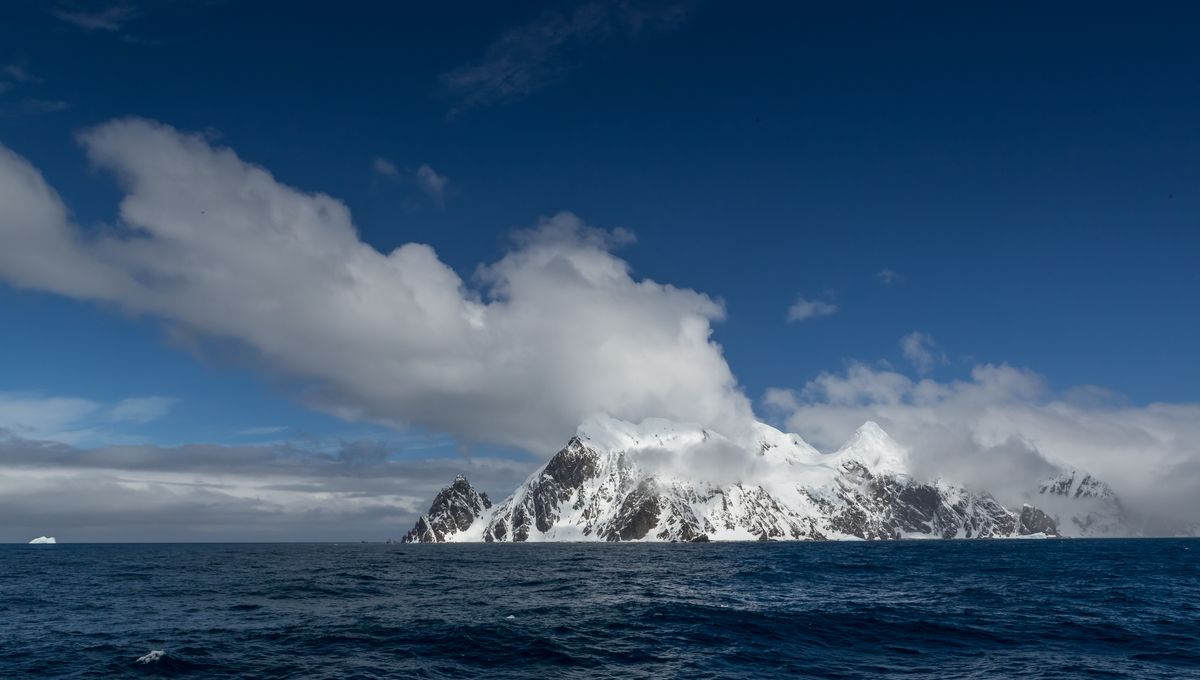
Humans are too recent arrivals on Earth to have taken advantage of a time when Antarctica was habitable, let alone when continental drift made it possible to walk there. Nevertheless, humans have visited many places they found too forbidding to stay, raising the question of whether humans saw, or even set foot on, Antarctica before records were kept.
Although Antarctica’s location has been stable a lot longer than the other continents, it certainly hasn’t always been icebound. During the Cretaceous, when the world was warmer, it had rainforests around its coast; even the long winters did not deter dinosaur inhabitants. However, those days were long gone before humans, even early humans such as Homo erectus, appeared on the scene.
Consequently, even during interglacial periods it’s unlikely any part of Antarctica would have been habitable without modern technology. Moreover, such warm periods would have been the worst time to try to colonize the place. High sea levels during interglacials, driven by the partial melting of Antarctica and Greenland, would have made the seas around the continent an even more extensive barrier than they are today.
Plenty of people who take Alien Vs. Predator as a documentary think hi-tech ancient civilizations built cities beneath the ice, but there is not a scrap of evidence to support that. Not even evidence hidden by the laughingly named “big archaeology”.
That doesn’t mean the history of human interaction with Antarctica began with Europeans, however. The extraordinary feats of Polynesian navigation, reaching places as remote as New Zealand, Hawai’i and Rapa Nui, suggest it may not have been beyond their capacity to find a much larger, albeit more inhospitable, land further south.
Dr Priscilla Wehi the University of Otago of led a study exploring the Māori connection to Antarctica. Along with a modern contribution to exploration and research, Wehi and coauthors point to evidence New Zealand’s indigenous people were aware of the continent’s existence. Whales play a central role in Māori culture, including species that feed off the Antarctic coast and migrate north to breed.
Tales of sailor Hui Te Rangiora who led a boat into the far Southern Ocean, probably following migrating whales, appear to date to around 1,400 years ago. How close to Antarctica the voyage got is unknown. However, the name Te tai-uka-a-pia – meaning the “frozen ocean” – for those waters was handed down, indicating someone had seen ice floes at least, and perhaps even the land itself.
It is much closer from Tierra Del Fuego to the Antarctic Peninsula than it is from New Zealand to East Antarctica. The Yaghan people of the island didn’t embark on the epic voyages the Polynesians did, and until recently were not thought to have sailed far from their shores.
That view has been called into question recently, with evidence presented that Native Americans visited the Falkland Islands, and possibly stayed a while, in the 14th century. Indeed, there are more tentative hints such visits began thousands of years earlier.
These claims are not universally accepted, but if they are right, it would be much more plausible that people set foot on the Antarctic Continent long before European exploration. The Drake Passage between the South Shetland Islands and South America is about 800 kilometers (480 miles) wide, less than twice the distance between the Falklands and the South American mainland. The passage is notoriously rough, even more dangerous than the South Atlantic, but if people made the voyage to the Falklands, it’s not impossible they also reached the island chain around the same time. From there, it would have been a relatively small step to the Antarctic Mainland.
Nevertheless, no reliable evidence that this happened has been reported, although forgeries have. Moreover, if people couldn’t establish an ongoing settlement at the Falklands with the technology of the day, they would have found Antarctica even less appealing, whether the mainland or islands off the coast.
Consequently, while it is quite possible that people knew of Antarctica before the Age of Discovery, and may even have set foot there, proof remains elusive and they certainly didn’t stay.
Archaeology in Antarctica is a serious topic, but most of it is focused on the legacy of 19th and 20th century explorers, and those who followed the whales for less benign purposes. If earlier visitors left any traces, they will not be easy to find.
Source Link: Did Prehistoric Humans Ever Inhabit Antarctica?